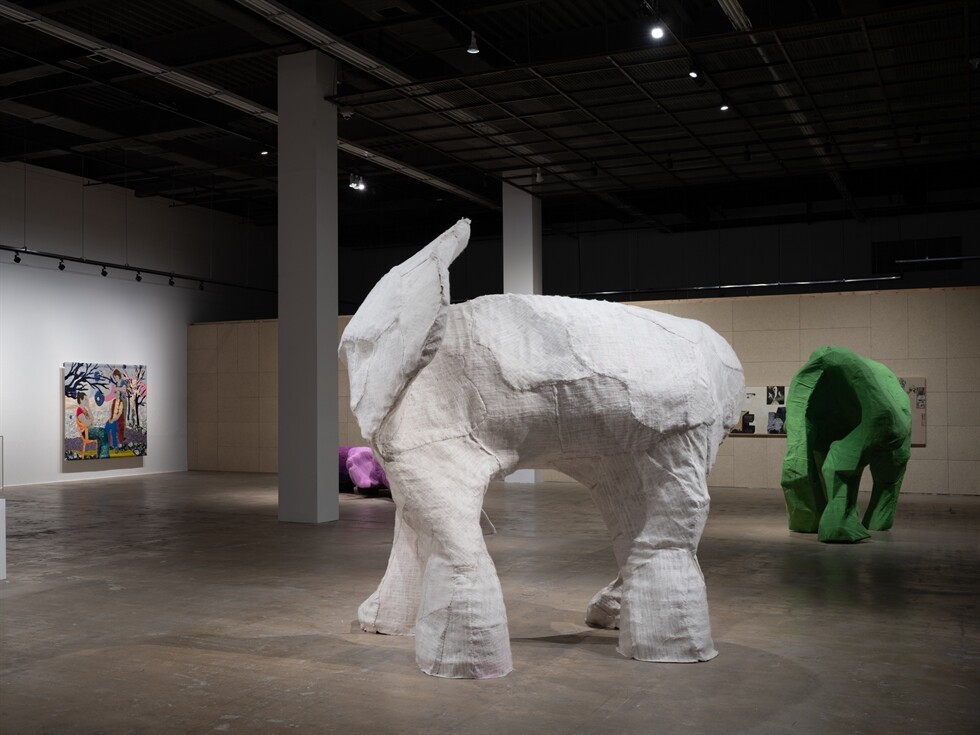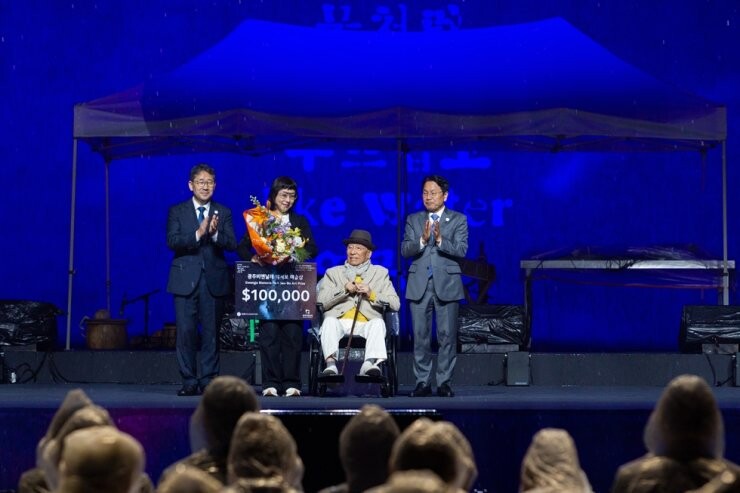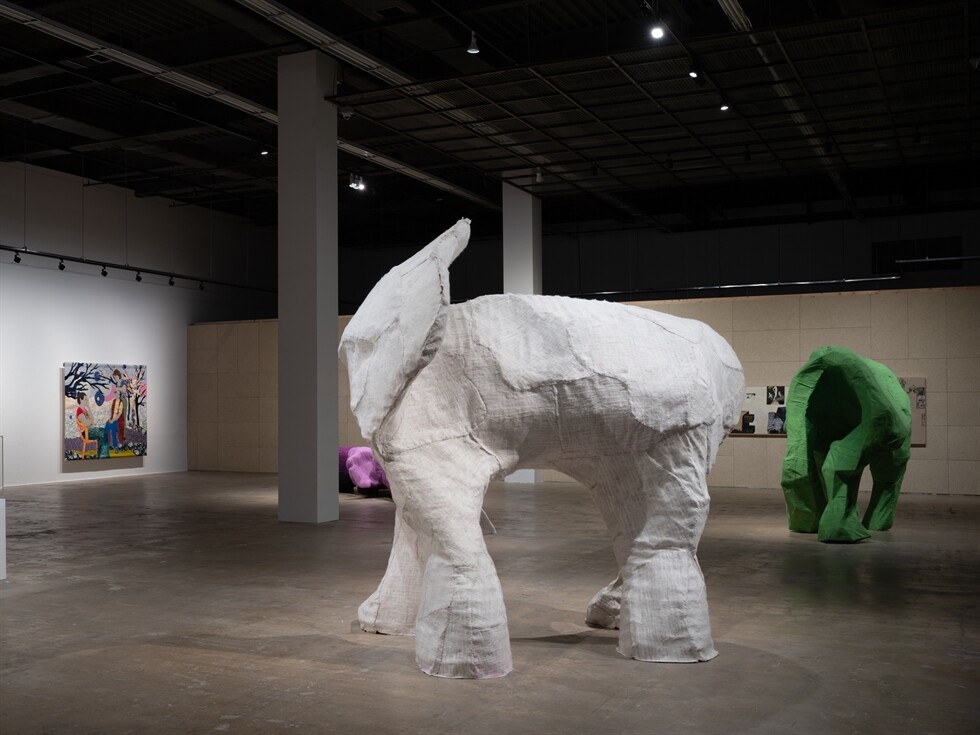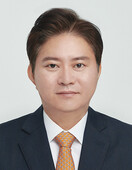Gwangju, South Korea - The Gwangju Biennale Foundation has made the decision to officially abolish the newly established Park Seo-bo Art Prize following backlash from local artists. Critics argued that the award, named after the renowned "dansaekhwa" (monochrome painting) master, failed to embody the founding political spirit of Asia's longest-running contemporary art exhibition.
The Gwangju Biennale, founded in 1995 in the southwestern city that witnessed the 1980 pro-democracy uprising against military dictatorship, has consistently emphasized the so-called "Gwangju Spirit" in its mission and exhibition themes.
The newly introduced prize, sponsored by Park's non-profit GIZI Foundation, was launched during this year's biennale with the intention of recognizing outstanding artists or collectives participating in the exhibition. The $1 million prize was intended to be divided into 10 awards, spanning the next 10 iterations of the event until 2042, in order to support contemporary creators and their practices.
The inaugural award of $100,000 was bestowed upon Korean artist Oum Jeong-soon for her "Elephant without Trunk" exhibit. The installation featured life-size fabric sculptures of trunk-less elephants, representing the artist's long-standing collaboration with the visually impaired.
 |
| ▲ The inaugural $100,000 Park Seo-bo Art Prize went to Korean artist Oum Jeong-soon for her fabric sculpture, "Elephant without Trunk" (2023), during the opening ceremony of this year's Gwangju Biennale, April 6. Courtesy of the artist, Gwangju Biennale Foundation |
However, the award faced criticism when several local artist groups raised concerns over Park's perceived detachment from the country's turbulent political history throughout his artistic career, and by extension, from Gwangju's own history.
The detractors distributed a leaflet during the biennale's opening ceremony on April 6, stating, "While pursuing Abstract Expressionism, Art Informel, and monochrome paintings, Park Seo-bo remained silent about the April 19, 1960 protests against the autocratic rule of then-president Syngman Rhee. He conformed to the military regime of the 1970s and turned a blind eye to the pro-democracy movements of the 1980s." Park, a seminal figure in the Korean modern abstract art scene and a founding member of the influential dansaekhwa movement, is widely recognized both domestically and internationally for his iconic "Ecriture" series, which emphasizes the purposeless and endless repetition of the artist's activities to the point of self-emptying.
 |
| ▲ Courtesy of Gwangju Biennale Foundation |
In a statement released on Wednesday, the Gwangju Biennale Foundation acknowledged the concerns raised within the local art community and announced the abolition of the prize. The foundation also pledged to adopt more progressive measures to develop an award system in the future. The remaining funds, excluding the $100,000 awarded last month, will be returned to the GIZI Foundation.
On Facebook and Instagram, the 91-year-old artist expressed his regret, stating, "It is regrettable that this issue arose on the day of the Gwangju Biennale. I have a dream - to establish my own art museum, regardless of size, to create a scholarship supporting the next generation of creators, and to establish an art award. All three dreams were progressing steadily. However, it appears that I will have to pursue my final dream through a different avenue."
Coinciding with the announcement of the prize's abolishment, the foundation revealed that Nicolas Bourriaud has been appointed as the artistic director for the 15th edition of the Gwangju Biennale, scheduled for September 2024, marking the event's 30th anniversary. Bourriaud, a French curator and art critic, brings extensive experience from curating large-scale shows such as the 2009 Tate Triennial, the 2014 Taipei Biennale, and most recently, the 2019 Istanbul Biennale. Bourriaud expressed his vision for the upcoming exhibition, stating, "The exhibition will delve into a universal and seemingly straightforward theme: our relationship with space. Exploring this theme will pose challenges as redefining or reshaping space emerges as a common concern encompassing climate change, feminism, post-colonialism, and the future of our planet."
The appointment of Nicolas Bourriaud as artistic director coincided with the announcement of the Park Seo-bo Art Prize's discontinuation. The foundation's decision reflects their commitment to addressing the concerns raised by the local art community and their dedication to fostering a more progressive and inclusive award system in the future.
The Gwangju Biennale, renowned for its exploration of contemporary art and its resonance with the city's history, remains steadfast in its mission to champion artistic expression while upholding the spirit of Gwangju's pro-democracy movements.
As preparations for the 15th edition of the Gwangju Biennale gain momentum under the leadership of Nicolas Bourriaud, the art world eagerly anticipates an engaging and thought-provoking exhibition that will navigate the complex dynamics of our relationship with space.
Sayart.net
Jason Yim yimjongho1969@gmail.com
Gwangju, South Korea - The Gwangju Biennale Foundation has made the decision to officially abolish the newly established Park Seo-bo Art Prize following backlash from local artists. Critics argued that the award, named after the renowned "dansaekhwa" (monochrome painting) master, failed to embody the founding political spirit of Asia's longest-running contemporary art exhibition.
The Gwangju Biennale, founded in 1995 in the southwestern city that witnessed the 1980 pro-democracy uprising against military dictatorship, has consistently emphasized the so-called "Gwangju Spirit" in its mission and exhibition themes.
The newly introduced prize, sponsored by Park's non-profit GIZI Foundation, was launched during this year's biennale with the intention of recognizing outstanding artists or collectives participating in the exhibition. The $1 million prize was intended to be divided into 10 awards, spanning the next 10 iterations of the event until 2042, in order to support contemporary creators and their practices.
The inaugural award of $100,000 was bestowed upon Korean artist Oum Jeong-soon for her "Elephant without Trunk" exhibit. The installation featured life-size fabric sculptures of trunk-less elephants, representing the artist's long-standing collaboration with the visually impaired.
 |
| ▲ The inaugural $100,000 Park Seo-bo Art Prize went to Korean artist Oum Jeong-soon for her fabric sculpture, "Elephant without Trunk" (2023), during the opening ceremony of this year's Gwangju Biennale, April 6. Courtesy of the artist, Gwangju Biennale Foundation |
However, the award faced criticism when several local artist groups raised concerns over Park's perceived detachment from the country's turbulent political history throughout his artistic career, and by extension, from Gwangju's own history.
The detractors distributed a leaflet during the biennale's opening ceremony on April 6, stating, "While pursuing Abstract Expressionism, Art Informel, and monochrome paintings, Park Seo-bo remained silent about the April 19, 1960 protests against the autocratic rule of then-president Syngman Rhee. He conformed to the military regime of the 1970s and turned a blind eye to the pro-democracy movements of the 1980s." Park, a seminal figure in the Korean modern abstract art scene and a founding member of the influential dansaekhwa movement, is widely recognized both domestically and internationally for his iconic "Ecriture" series, which emphasizes the purposeless and endless repetition of the artist's activities to the point of self-emptying.
 |
| ▲ Courtesy of Gwangju Biennale Foundation |
In a statement released on Wednesday, the Gwangju Biennale Foundation acknowledged the concerns raised within the local art community and announced the abolition of the prize. The foundation also pledged to adopt more progressive measures to develop an award system in the future. The remaining funds, excluding the $100,000 awarded last month, will be returned to the GIZI Foundation.
On Facebook and Instagram, the 91-year-old artist expressed his regret, stating, "It is regrettable that this issue arose on the day of the Gwangju Biennale. I have a dream - to establish my own art museum, regardless of size, to create a scholarship supporting the next generation of creators, and to establish an art award. All three dreams were progressing steadily. However, it appears that I will have to pursue my final dream through a different avenue."
Coinciding with the announcement of the prize's abolishment, the foundation revealed that Nicolas Bourriaud has been appointed as the artistic director for the 15th edition of the Gwangju Biennale, scheduled for September 2024, marking the event's 30th anniversary. Bourriaud, a French curator and art critic, brings extensive experience from curating large-scale shows such as the 2009 Tate Triennial, the 2014 Taipei Biennale, and most recently, the 2019 Istanbul Biennale. Bourriaud expressed his vision for the upcoming exhibition, stating, "The exhibition will delve into a universal and seemingly straightforward theme: our relationship with space. Exploring this theme will pose challenges as redefining or reshaping space emerges as a common concern encompassing climate change, feminism, post-colonialism, and the future of our planet."
The appointment of Nicolas Bourriaud as artistic director coincided with the announcement of the Park Seo-bo Art Prize's discontinuation. The foundation's decision reflects their commitment to addressing the concerns raised by the local art community and their dedication to fostering a more progressive and inclusive award system in the future.
The Gwangju Biennale, renowned for its exploration of contemporary art and its resonance with the city's history, remains steadfast in its mission to champion artistic expression while upholding the spirit of Gwangju's pro-democracy movements.
As preparations for the 15th edition of the Gwangju Biennale gain momentum under the leadership of Nicolas Bourriaud, the art world eagerly anticipates an engaging and thought-provoking exhibition that will navigate the complex dynamics of our relationship with space.
Sayart.net
Jason Yim yimjongho1969@gmail.com



















